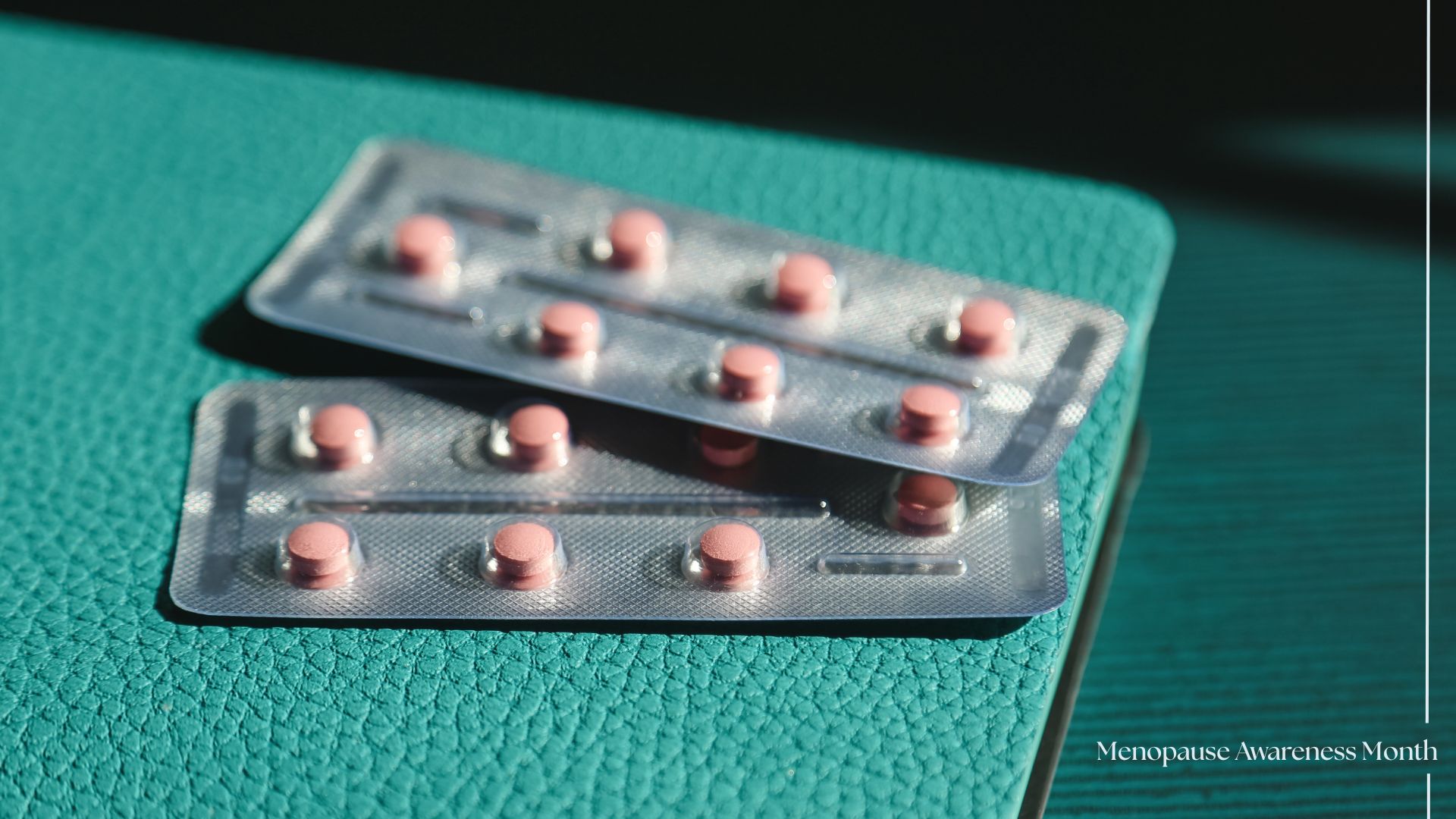The pros and cons of HRT - and all you need to know about hormone replacement therapy
There are pros and cons of HRT, just like anything else. Here, the doctors reveal what you need to know before making a decision


For an estimated eight out of 10 women who experience physical and emotional symptoms leading up to menopause, hormone replacement therapy (HRT) is a treatment option.
It's not the only way to manage perimenopause symptoms - there are plenty of HRT alternatives to consider if you don't want to take or can't take the medication - but it's undoubtedly one of the most popular, with more than two million British women taking HRT for issues like hot flushes, night sweats, insomnia, vaginal dryness, and more.
The medication works by replacing the oestrogen and/or progesterone that naturally starts to decline in our bodies at the start of perimenopause.
As with any medical decision, it's important to speak to your doctor if you're struggling with any menopause symptoms and want to know if treatment can help. In the meantime, we've talked to several doctors and advanced menopause specialists to reveal the pros and cons of HRT.
What is hormone replacement therapy (HRT)?
Hormone replacement therapy (HRT) is a treatment that replaces oestrogen, progesterone, or both. These are important hormones in the body that start to decline in perimenopause, contributing to physical and mental health symptoms, such as hot flushes and brain fog.
There are different types of HRT, says Dr Shirin Lakhani, a GP and menopause specialist. "Women with a womb should receive oestrogen and progesterone (i.e. combined HRT) and those who have had a hysterectomy are offered oestrogen-only HRT," she explains.
It also comes in different forms, including patches, tablets, gels, sprays, and vaginal products. "Each method has its advantages and disadvantages so, ultimately, the choice should be with you as to which method suits you best," she says.
Sign up to our free daily email for the latest royal and entertainment news, interesting opinion, expert advice on styling and beauty trends, and no-nonsense guides to the health and wellness questions you want answered.
However, it's not a suitable option for everyone with benefits and risks just like any other medication, so be sure to speak to your GP before making a decision.

Dr Shirin Lakhani is a GP, specialising in intimate health, menopause, hormone health, and women's wellness in general. She has also previously worked as an NHS doctor, gaining experience in several other hospital specialities, including general surgery.
The pros of hormone replacement therapy
The main advantage of HRT is that it makes women feel better, says Dr Naomi Potter, a menopause specialist and the co-author of Menopausing with Davina McCall. "This is hugely important and must not be understated. Many women have an array of unpleasant symptoms, and HRT can give quality of life back."
The key benefits include:
- Eases vasomotor symptoms: Vasomotor symptoms include hot flushes and night sweats. "A drop in oestrogen levels causes these. HRT increases these levels again, helping to combat symptoms," says Dr Cliona O'Connell, a GP and women's health specialist.
- Reduces vaginal dryness: "Urogenital atrophy is a condition that affects the tissue quality of the vulva, vagina, and bladder. It's again caused by the decrease in oestrogen during menopause and this is something that can be treated with HRT or vaginal oestrogen," says Dr O'Connell.
- Improves skin and hair quality: Declining hormone levels have been linked to changes in skin quality and hair thinning in women. "HRT can provide the hormones and nutrients required to keep skin and hair strong and healthy throughout menopause," she says.
- Reduces risk of adverse health conditions: "HRT also has advantages of bone and cardiovascular protection," adds Dr Potter. As oestrogen has protective qualities for the bones, heart, and other organs, maintaining levels can reduce the risk of adverse health conditions affecting these, such as osteoporosis and heart disease.
- May improve symptoms of anxiety and depression: Depression and anxiety in menopause are common symptoms, and there is some evidence to suggest that HRT can improve these symptoms.

Dr Naomi Potter is a highly qualified doctor with an advanced certification from the British Menopause Society - the highest level of menopause training available. As well as being registered with the Royal College of General Practitioners and with the UK General Medical Council, Naomi is also a Diplomate of the Royal College of Obstetricians and Gynaecologists, and the Faculty of Sexual and Reproductive Health.
She wrote Menopausing: The positive roadmap to your second spring alongside Davina McCall, with the second edition now available to order.
Cons of hormone replacement therapy
The main disadvantages are potential side effects such as erratic bleeding and the 'hassle factor', says Dr Potter, as it can require some "messiness and monitoring" to get the dosage right.
"For some women, these factors mean it isn’t worth it. In terms of true risk, there is debate amongst scientists because data varies, but if there is a small increased risk of breast cancer, that increase is very small," she says.
The main disadvantages of HRT include:
- Breast tenderness: "Breast tenderness is common when starting HRT, but as our bodies get used to the medicine, it will usually subside," says Dr O'Connell.
- Headaches: Just as one symptom of low hormone levels is headaches, the influx of extra hormones can also cause headaches for some women. "Headaches can be brought on by the increased oestrogen levels introduced to our bodies through HRT, but again, this may ease as our bodies get used to the new hormone levels," she says.
- Bloating: HRT is one of the common causes of bloating for those on the therapy, says Dr O'Connell, as "rapid hormone changes mean the body can retain water" easily.

Dr Cliona O’Connell has over 20 years working as a GP. She is a trained menopause expert and the creator of a Multi-Meno supplement, designed for women in this stage of life.
Is HRT safe for women?
The NHS says that the benefits of HRT more often outweigh the risks. The guidance says: "If you're under 60 years old, have menopause symptoms, and are not at high risk of breast cancer or blood clots, the benefits of HRT are likely to outweigh the risks."
Dr Potter agrees on the pros and cons of HRT. Though "everyone is different", it's an "extremely safe option for the majority of women" and we "should not be scared of HRT", she says.
Many people are sceptical of the treatment and don't believe it to be safe due to the narrative around HRT in recent years. "There is debate, less consensus, and now so much information and misinformation that women are now finding themselves confused and a bit overwhelmed by differences in opinion," says Dr Potter.
That's why it's important to research HRT and discuss your options with your doctor. It may not be suitable for you if you have a history of breast, ovarian, or womb cancer, a history of blood clots, untreated high blood pressure, liver disease, or are pregnant, so be sure to discuss all your medical history with your medical practitioner.
When to start hormone replacement therapy
There's no 'right' time to start medication if you choose to go down that route after weighing up the pros and cons of HRT - but many women are prescribed it when they begin to experience symptoms of perimenopause.
"Before considering HRT, women need to be counselled on the benefits, side effects and risks. The benefits far outweigh the risks and side effects on the whole, but every woman’s situation and perception are different, and they need to be taken into account," says Dr Potter.

About 15% of women between 45 and 64 are prescribed HRT in England at the moment.
What are the first signs that HRT is working?
The first sign that HRT is working is when you feel some relief from symptoms such as hot flushes, night sweats, and poor sleep. "This can take up to three months sometimes, and you may need to adjust your dosage," warns Dr Lakhani.
“Symptoms such as low libido, brain fog, hot flashes, night sweats, mood swings or mood changes should improve after 3 months of HRT, and if they aren’t, I would speak to your healthcare professional about changing dosages," she says.
Can I just stop taking hormone replacement therapy?
The experts recommend weaning yourself off gradually if you have started hormone replacement therapy and, for whatever reason, decided it's not for you. "It's not recommended to stop taking oestrogen overnight as it can cause temporary oestrogen withdrawal, which can worsen menopause symptoms," warns Dr Lakhani.
"Instead, I recommend gradually reducing the dosage over 3 to 6 months so your body can adjust to the fluctuation of hormones," she says.
However, before doing so, speak to your doctor, who will be able to discuss the best approach for you and possible alternatives.
Can hormone replacement therapy help with weight loss?
Weight gain and the so-called 'menopause tummy', thanks to a change in how weight is distributed, are common in menopause. However, there's not much evidence to suggest that HRT can help with this specific issue, says Dr O'Connell. Instead, "good nutrition and an active and healthy lifestyle remain two of the most important factors" to manage this.
"What HRT does is help maintain increased energy and hormone levels, making it easier to maintain a good active life and exercise regime. By reducing symptoms like tiredness, brain fog and anxiety, HRT will allow women to live as normal and balanced a life as possible," she says.
Does hormone replacement therapy cause hair loss?
Just like any medication, there are side effects of HRT, and a strong link has been established between hair loss and menopause, with HRT being one cause. "This is due to the changes in hormones, specifically oestrogen and progesterone," says Dr Lakhani. "These hormones play a part in our hair health and growth, and so fluctuations of the hormones can cause hair to thin, shed and even grow slower."
She also points out that menopause can cause the same issues for the same reasons - "due to a decreased level of oestrogen, progesterone, and testosterone," she says. "And it's important to note that not all women on HRT experience hair loss. In some cases, HRT can actually improve hair growth."
HRT patches vs tablets vs gels
- Tablets are most common: "You can get both oestrogen-only and combined HRT in tablet form. A lot of women find this easiest as they just have to take one tablet once a day, so it may be easier to remember," says Dr Lakhani. "However, some research has shown that tablets present a (albeit small) risk of blood clots in comparison to other forms."
- You have to switch out patches often: "Patches are generally quite popular as well, as you just have to stick a patch to the lower part of your body and it gradually releases small amounts of hormones into your body," she says. "Generally, you need to change the patch every few days, and some women struggle to apply the patch or get it to stick."
- Gels and sprays are oestrogen-only: “Gels and sprays are also an increasingly popular form. However, on the NHS, they are only available in oestrogen-only form. You just need to apply it onto the skin once or twice a day for the hormones to be absorbed into the body," she says.
If you are thinking about hormone replacement therapy, have questions, or want to discuss your options, speak to your GP. This article is not intended as medical advice.

Grace Walsh is woman&home's Health Channel Editor, working across the areas of fitness, nutrition, sleep, mental health, relationships, and sex. She is also a qualified fitness instructor. In 2025, she will be taking on her third marathon in Brighton, completing her first ultra marathon, and qualifying as a certified personal trainer and nutrition coach.
A digital journalist with over seven years experience as a writer and editor for UK publications, Grace has covered (almost) everything in the world of health and wellbeing with bylines in Cosmopolitan, Red, The i Paper, GoodtoKnow, and more.
You must confirm your public display name before commenting
Please logout and then login again, you will then be prompted to enter your display name.